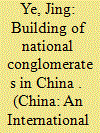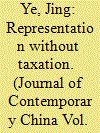| Srl | Item |
| 1 |
ID:
157298


|
|
|
|
|
| Summary/Abstract |
Why do central state-owned enterprises (SOEs) in China enjoy rapid development while, overall, the state-owned economy is experiencing a contraction? The extant theories have separately argued that the support of the central government and compliance with market requirements are the driving forces behind the success of central SOEs. However, these theories have neglected the local governments’ role in the expansion of central SOEs. This article contends that variations in provincial fiscal capacity have contributed to the development of central SOEs. If a province has a weak fiscal capacity, local governments welcome central SOEs to merge with their local SOEs. In this way, the local governments can save up the fiscal grants intended for local SOEs and promote local economic development. At the same time, central SOEs gain access to the resources and expand their markets by merging with the local SOEs, thereby strengthening the central SOEs. On the contrary, if a province has a strong fiscal capacity, the local government will invest a large amount of fiscal resources to help its local SOEs survive. As a result, the expansion of central SOEs is hindered in such type of province. This article uses paired comparison of two provinces in China, Zhejiang and Liaoning, to test this hypothesis.
|
|
|
|
|
|
|
|
|
|
|
|
|
|
|
|
| 2 |
ID:
141457


|
|
|
|
|
| Summary/Abstract |
The question of why some authoritarian regimes choose to incorporate institutions of democracy such as village elections into their governing systems remains largely unanswered. As a typical case of a resilient authoritarian state that implements democracy in its villages, China has provided an invaluable case for researchers to study. Current theories focus on the influence of political elites and rural forces separately. Insightful as they are, these theories are invalid as an explanation of the variation of local governance in China across time and thus are incomplete. It should be recognized that central fiscal strategies have great effects on local governance. Specifically, if the central government largely relies upon fiscal revenue from rural areas, it has to expand its bureaucracy to the countryside to extract revenue. In contrast, if it does not rely on the rural areas for revenue, the central government will establish local democracy in the countryside. This hypothesis is historically reflected in the authoritarian regimes led by the Nationalist Party (KMT) and Chinese Communist Party (CCP) in China. As opposed to the familiar story about representation through taxation, the logic of representation without taxation seems to be the case in China.
|
|
|
|
|
|
|
|
|
|
|
|
|
|
|
|